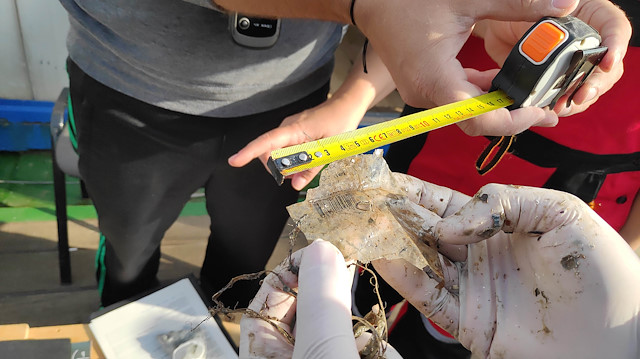
- Giving up plastics entirely is a tall order but recycling can extend their usage, say experts
By Erdogan Cagatay Zontur and Dilara Hamit
ANKARA (AA) – What happens to a plastic bottle after you throw it into the waste bin? Experts say almost any plastic can be recycled, if you do it right.
Unfortunately, more than half of the plastic produced in the world becomes waste in less than a year, ending up in landfills and incinerators, according to the World Wildlife Fund (WWF).
So, what can be done to extend the life cycle of plastic? We asked the experts.
Ugur Bilgic, the head of Cevnak, a waste-sorting facility in Ankara, explained what he does at his end.
“Our workers and garbage collectors separate packaging waste from domestic waste.”
The sorted-out waste is then transferred to recycling facilities to produce raw material. Each type of plastic has a different value.
"For example, a dialysis canister is a very valuable plastic product and has a different financial value in recycling. Rigid plastics are less valuable, as they are difficult to recycle and do not contain some chemicals.
“Food crates contain calcite, which means they are not made of pure raw material, which leads to a loss in value," he added.
He warned against mixing plastic with household waste.
“A plastic mixed with garbage can’t be recycled,” he said.
- What next?
The sorted-out plastic is sent to a recycling facility.
Orhan Direk, director of the solid waste plant at Sincan district, said the sorted-out plastic is sent to a shredding machine.
“Manual separation is done only at the welts, where employees separate plastics into the correct containers. Plastics are collected in large tanks according to their quality and type and then transferred to the shredding machine,” he said.
Shredded plastics, also called granules, are washed. The granules which float on the surface are first-class materials, while those that sink to the bottom are classified as second-class. The used water is filtered in a machine.
The granules are dried and sent to machines to be melted at 200-220 C (392-428 F).
At this stage, pigments are added to color first-class granules, while second-class granules naturally come out black.
It takes an hour to separate plastic waste, break them into granules, wash and melt the granules, and turn them into raw materials.
The raw material can be used to produce anything under the sun, from chairs to pillows and from jackets to computer parts.
However, recycled plastic cannot be used for food as it may be contaminated.
- Plastics that pollute
Plastic bags are the top environmental pollutants, Direk said.
The color used in printing plastic bags cause the material to burn, so its quality suffers, he added.
Stressing that Turkey’s Zero Waste project is a positive step in reducing the use of plastic bags, Direk said: “The project not only aims to reduce the use of the bags or recycling materials, but it also aims to cut waste production and consumption in general.”
Turkey’s Zero Waste Management System regulation aims to reduce the volume of non-recyclable waste as well as hold public institutions, organizations, and city governments with populations of more than 250,000 responsible for waste management by 2020.
According to the UN, a reduction of 15-20% in worldwide greenhouse gases emissions could be achieved through sustainable waste management.
In recent times, climate change and pollution have become top issus in governments across the developed world.
Keeping up, the European Parliament in March approved a law to ban single-use plastic items such as plates, cutlery and plates, straws, and cotton buds sticks by 2021.
The law binds EU members to achieve a 90% collection target for plastic bottles by 2029. Plastic bottles will also have to contain at least 25% of recycled content by 2025 and 30% by 2030.


